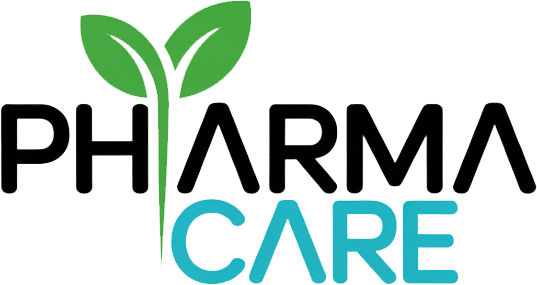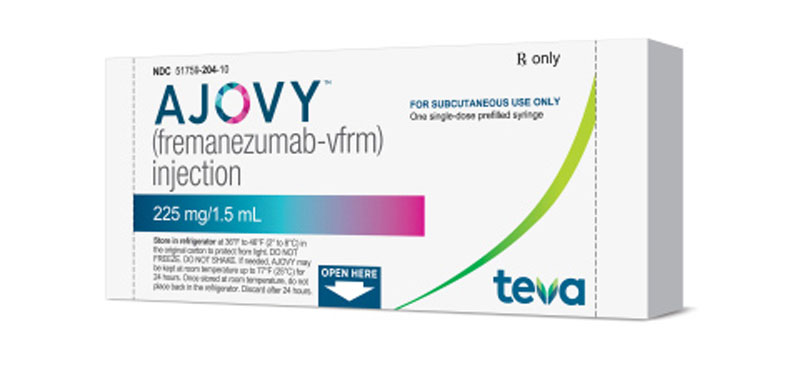Migraine is one of the most complex and disruptive pain conditions in daily life. Many people struggle with recurrent migraine attacks that can impair function, concentration, and quality of life. Ajovy, also known as Fremanezumab, is a relatively new biologic drug. It offers a unique solution for patients suffering from chronic and episodic migraine. This drug was created from in-depth research into the pain pathways associated with a substance called CGRP (Calcitonin Gene-Related Peptide). Its precise mechanism of action positions it as a true breakthrough in the field of migraine prevention treatments.
In addition to the extensive research that has been done on it, Ajovy also offers a treatment method that does not require daily intake. This fact gives patients the opportunity to live a life almost free of daily medication. In the following paragraphs, we will dive into the mechanism of action of Ajovy, understand who it is suitable for, and learn about the possible side effects. In addition, we will examine how it is used, focus on the different doses, and compare it to other medications for the treatment and prevention of migraine.
It is important to remember that the information presented here is of a general nature and is not a substitute for personal medical advice. However, this article is intended to provide readers with a broader understanding of Ajovy and the treatment options available on the market. It is recommended that anyone suffering from migraine consult a specialist and assess the suitability of the drug for their medical condition.
1. What is Ajovy (Ajovy/Fremanezumab)?
Ajovy is an innovative biologic drug for preventing migraines, also known as Fremanezumab. It is a monoclonal antibody specifically developed to block the activity of the CGRP protein. CGRP is a key component in the development of migraine attacks. When its levels increase, blood vessels in the brain dilate, which can trigger or worsen severe headache attacks. Ajovy blocks this mechanism of action in a targeted manner.
Why is the designation of a drug as a “biologic” so important? Biologics are based on engineered proteins or molecules that resemble natural components in the body. They are designed to act on specific signaling mechanisms, allowing them to be more precise and effective than generic chemical drugs. In addition, many biologics provide new solutions to diseases and medical conditions that have previously had limited treatment. Ajovy is joining this trend with its exclusive focus on CGRP.
Parmanezumab, the active ingredient in Ajovy, blocks the binding of CGRP to its receptors. The result is a significant reduction in the occurrence of inflammatory processes and the expansion of cerebral blood vessels. In recent years, Ajovy has been considered one of the most promising treatments in the field of pain neurology. At the same time, clinical studies indicate that in suitable patients it reduces the frequency and severity of migraines.
2. What is Ajobi used for?
Ajovy was developed for people with episodic migraine and chronic migraine. Episodic migraine is characterized by a lower number of attacks per month (usually fewer than 15 days of pain per month). In contrast, chronic migraine involves 15 or more days of headache per month, of which at least eight days have migraine characteristics. Patients who transition to chronic migraine may experience a significant decline in quality of life. They may find it difficult to cope with complicated treatment guidelines or daily medications.
This is where Ajovy comes in. It offers an effective preventative treatment for those who have already tried other treatments without sufficient improvement. For example, patients who have tried migraine medications from different families (such as beta-blockers, tricyclic antidepressants, or anticonvulsants) and have not received adequate relief may consider Ajovy. Because Ajovy is not a “daily” medication in the conventional sense, it reduces the need to remember to take pills frequently.
Why is prevention important? Rather than treating pain when it occurs, a preventative approach can reduce the frequency and intensity of attacks. Many patients report a dramatic reduction in the number of days of monthly pain after starting treatment with Ajovy. Furthermore, those who suffer from severe and prolonged migraines sometimes get a “vacation” from the intensity of attacks when preventive treatment is successful. However, it should be remembered that not everyone can receive Ajovy. Therefore, it is important to make an accurate diagnosis and receive a detailed recommendation from a specialist before starting treatment.
3. How does Ajobi work?
3.1 Mechanism of action: CGRP blockade
The key to understanding how Ajobi works lies in the effect of CGRP on pain. CGRP (Calcitonin Gene-Related Peptide) is a peptide that plays an important role in neurovascular pain, especially in the pain associated with migraine attacks. During an attack, the level of CGRP in the blood and in the trigeminal nerve increases, which contributes to the dilation of blood vessels and pain signals. Ajobi is a monoclonal antibody that attaches to the CGRP molecule and prevents it from binding to its receptors. As a result, the harmful activity of the protein is reduced, and the frequency and severity of attacks decrease.
3.2 Method of administration: Subcutaneous injection
Ajovy is given by subcutaneous injection, and this process is relatively simple. The injection can be performed independently after appropriate training, or by going to a clinic for this purpose. The injections are given in areas where the skin is soft and suitable for injections (for example, in the abdomen or thigh). For people who suffer from migraines frequently, the ability to self-treat is another mitigating factor. There is no need to spend a lot of time waiting for appointments or making frequent visits to the clinic.
3.3 When does the effect begin?
Many patients want to know how long it takes for Ajovy to take effect. Clinical studies suggest that improvement can be seen as early as one to two weeks after starting treatment. However, some patients report more significant improvement after several more weeks. This also depends on the initial medical condition and how the body responds to treatment. It is important to be patient and continue to monitor the frequency of attacks regularly throughout the treatment period.
3.4 How long does Ajobi stay in the body?
Ajovy has a relatively long half-life. This means that the drug is broken down slowly in the body. This fact allows for a longer interval between injections, and allows for two main treatment methods to be chosen: monthly injection or injection once every three months. This choice is made according to the patient's preference and the instructions of the treating physician. Thanks to the long half-life, the level of Fremanezumab in the blood is maintained at a stable level, which allows for continuous protection against migraine attacks.
4. Dosages and instructions for taking
4.1 The two main dosage routes
There are two main options for getting an Ajob:
1. One injection (225 mg) once a month
This is the appropriate option for patients who prefer more frequent monitoring. A monthly injection creates a more even distribution of the dose throughout the month, and sometimes gives some patients a sense of security.
2. Three injections (total 675 mg) once every three months
This method allows for one “loading dose” per quarter. The prolonged effect of Ajovy allows for the avoidance of frequent injections. Some patients prefer to reduce the frequency of injections to maintain a more comfortable routine.
4.2 Instructions for self-administration of the injection
Before starting treatment, the medical team instructs the patient on how to safely perform the injection. The procedure includes cleaning the area, lightly disinfecting it, and inserting the needle subcutaneously according to the instructions. Then, wait a few seconds and gently remove the needle. It is recommended to change the injection site each time, to prevent excessive local irritation. It is also advisable to follow the storage instructions for Ajovy: it should be kept in the refrigerator, but not frozen. If the medicine must be stored outside the refrigerator for a short period, the manufacturer's instructions should be read carefully.
4.3 The importance of tracking and monitoring
After starting treatment, regular follow-up with your doctor should be conducted. Follow-up includes checking the clinical response, assessing the frequency of attacks, and possible side effects. It is also recommended to keep a migraine diary, recording the days of pain and its intensity. This information will help the doctor get a complete picture and improve the dosage or instructions if necessary.
5. Side effects of Ajovy
5.1 Common side effects
One of the reasons Ajovy has gained such popularity is its good safety profile. However, like any biological or chemical medicine, there are still possible side effects. The most common reaction is a local reaction at the injection site. Such reactions include redness, local pain, swelling, or itching. In most cases, these effects are mild and go away on their own within a short time. If the injection was performed correctly, the reaction is likely to be minimal and will improve over time.
5.2 Less common and rare side effects
Other side effects are less common, but it is important to be aware of them. A serious allergic reaction, for example, is very rare, but it can occur. Its symptoms include difficulty breathing, a widespread rash, or excessive swelling. If an allergic reaction is suspected, seek immediate medical attention. In addition, a few cases of constipation have been reported after an Ajovy injection, but this is a small percentage of all patients. In most cases, the problem can be treated conservatively or goes away on its own.
5.3 Is Ajovy considered safe?
In the world of medicine, risk and benefit are always weighed against each other. Studies published in recent years indicate a high safety profile for Ajovy. Some patients report significant relief from migraines without significant side effects. On the other hand, in cases where the drug is not suitable, the doctor will recommend another alternative. In any case, the treating physician should be informed of any changes or the appearance of unusual side symptoms. Continuous monitoring allows for maximum safety and to get the most out of the treatment.
6. Stopping treatment with Ajovy
6.1 Is Ajobi addictive?
Ajovy (Fremanezumab) is not addictive. It is not a substance that affects the central nervous system in a similar way to other addictive drugs. In fact, taking Ajovy does not create physiological or psychological dependence on it. Therefore, patients are not expected to suffer from any withdrawal symptoms when stopping treatment. If the time comes to stop, this can be done in consultation with the doctor, and without the need for a special gradual reduction.
6.2 What happens when you stop?
When Ajovy treatment is discontinued, the level of the Fremanezumab antibody in the blood gradually decreases. The CGRP blocking mechanism is weakened, and therefore the preventive effect is reduced. Over time, migraines may return to their original frequency or intensity before treatment. However, short-term discontinuation of treatment for certain reasons (e.g., planned pregnancy or switching medications) does not result in increased exacerbations beyond baseline. It is recommended to consult a doctor about returning to treatment or switching to an alternative treatment.
7. Interactions with other drugs and alcohol
7.1 Drug interactions
One of the advantages of Ajovy is its specific targeting of CGRP blockade. Due to its targeted mechanism of action, it has few interactions with other medications. However, it is important to inform the treating physician about all medications and supplements that the patient is taking, including prescription medications, over-the-counter medications, and nutritional supplements. There is very little evidence of negative effects when combining Ajovy with other treatments. It can usually be incorporated into a complex migraine treatment, if necessary.
7.2 Alcohol and migraines
There is no known pharmacological interaction between Ajovy and alcohol. However, alcohol is known to be a potential trigger for migraine attacks for many people. Therefore, if a person is being treated with Ajovy, drinking alcohol may still cause an exacerbation of attacks. In other words, Ajovy preventive treatment does not completely “neutralize” the effect of alcohol on migraine triggers. The general recommendation for patients with migraine is to limit or completely avoid alcohol, depending on individual sensitivity.
8. Additional Frequently Asked Questions
8.1 Ajoubi during pregnancy and breastfeeding
Pregnant and breastfeeding women should consult a specialist before taking Ajovy. Information on the safety of this medicine during pregnancy is still limited. The decision to treat with Ajovy during pregnancy or breastfeeding will be weighed against the benefit-risk ratio, and according to the woman's clinical condition.
8.2 Ajobi price and health insurance participation
The price of Ajovy can vary depending on the various arrangements of the health funds. Sometimes, it is possible to receive a significant refund or discount through supplementary insurance. It is recommended to check with the relevant health fund what the participation is, and whether the drug is included in the health basket for a particular indication. In Israel, there are participation tracks through health funds such as Clalit or Maccabi, subject to eligibility conditions.
8.3 Ajovy vs. other drugs
There are other drugs that work by blocking the CGRP pathway, such as Emgality or Obalepta. The differences between them may be in the structure of the antibody, the frequency of injections, or the extent of clinical studies conducted. Ajovy is considered one of the first in the field, and is highly regarded among doctors and researchers. However, choosing the most appropriate drug depends on the patient's profile, medical history, and observed side effects.
8.4 Is Ajoubi dangerous?
Most studies indicate that Ajovy is safe and effective for most patients. The rate of serious side effects is very low, but no drug is completely risk-free. Doctors recommend regular testing and monitoring to identify unwanted reactions or ineffectiveness in time. If questions or concerns arise, it is advisable to seek medical advice and explore possible alternatives.
8.5 Does Ajovy cause obesity or weight loss?
There is no conclusive evidence that Ajovy causes significant weight gain or loss. Some patients report minor changes in eating habits due to reduced pain and fatigue. However, there is no research evidence that Ajovy itself causes weight gain or weight loss as a biological mechanism.
How Ajovy fits into a patient's routine
Ajovy offers great flexibility in the treatment method and frequency of injections. This is a real advantage, since not everyone can adhere to taking medication daily. Sometimes, one injection per month is enough to improve quality of life. For others, three consecutive injections every three months may be more appropriate. The frequency and dose can be adjusted according to the clinical response and the recommendations of the treating team.
People who deal with chronic migraine often have to balance preventive treatment with work, family, and leisure. Easy-to-use treatment, which does not require multiple visits to the clinic, provides a functional and emotional advantage. Many experience an improvement in their daily lives, as a reduction in the frequency and intensity of migraines makes it easier to carry out important plans and events.
Furthermore, Ajovy allows for a “breathing space” between attacks of pain. Patients who once had difficulty leading a full and active lifestyle are now discovering that they can plan trips, meetings, or social activities with less worry about the onset of crippling pain. This does not mean that migraines disappear completely for everyone, but the relief is noticeable. Moreover, the availability of the drug and its inclusion in health care packages in some countries contribute to wider accessibility. It is hoped that research and technological improvements will lead to more effective solutions for migraine in the future.
What does the clinical research say about Ajovy?
In recent years, many studies have been published examining the effectiveness of CGRP blockade for migraine prevention. These studies consistently indicate that this mechanism has a positive effect on the number of migraine days per month. Among all the studies, Fremanezumab (Ajovi) stands out as a drug that has undergone extensive clinical trials in the drug approval stages. The results of the studies showed a significant reduction in the frequency of attacks in both episodic and chronic migraine patients. Many participants also reported some relief in the intensity of attacks.
In comparative studies, the safety profile of Ajovy was examined alongside other medications. In most studies, it was observed that the side effect profile remained stable, and severe reactions occurred in low percentages. These findings, along with the ease of daily use, have encouraged doctors to recommend Ajovy as a first-line treatment for preventing severe migraines. Of course, this recommendation depends on individual medical criteria and the frequency of attacks.
Treatment Adaptation: Who should consider Ajovy?
Not every person with migraine will necessarily be suitable for biologic therapy. There are situations where other traditional treatments may be sufficient. However, Ajovy becomes particularly relevant when it comes to migraine sufferers who meet the following conditions:
1. Severe chronic or episodic migraine: When the attacks are very frequent and impair the quality of life.
2. Failure of previous treatments: Patients who have not responded well to beta-blockers, tricyclic antidepressants, or anticonvulsants.
3. Severe side effects from other medications: Sometimes, older birth control medications can cause weakness, weight changes, or effects on the nervous system. If those side effects are intolerable, Ajovy may be a better option.
4. Need for rapid improvementAjovy can help you see significant improvement in the first few weeks, although there are cases where it takes longer.
After the doctor takes a patient's medical history, examines the type of migraine, and assesses risk factors, a decision will be made about whether to start treatment with Ajovy or another medication. Part of the treatment may also include recommendations for a healthy lifestyle, reducing stress, and managing sleep habits. Studies indicate that combining healthy habits with appropriate preventive treatment can yield impressive results.
Complementary tools for migraine treatment
Ajovy doesn’t work in a vacuum. Sometimes, doctors incorporate it into a broader treatment plan. For example, lifestyle choices can affect how well the medication works. Maintaining a regular sleep schedule, eating a healthy diet, and avoiding known triggers (such as excessive caffeine or certain foods) can improve your response to medication. In some cases, psychotherapy or cognitive behavioral therapy (CBT) may help you cope with the impact of migraines on your daily life.
In addition, there are dietary supplements, herbs, or complementary medicine methods that patients consider as adjuncts. If you want to combine them, it is important to inform your doctor to avoid the risk of unwanted interactions. However, due to the accuracy and specificity of Ajovy in the CGRP pathway, the likelihood of serious interactions is relatively low. Still, the safest approach is to work in collaboration with qualified medical authorities.
Tips for coping with Ajovy treatment
1. Migraine diary management: Write down when the seizures started, how long they lasted, and how severe they were. This will help you track changes after starting treatment with Ajovy.
2. Injection routine: Choose a fixed day each month (or every three months) to give your injection. Set yourself an automatic reminder so you don't forget.
3. Checking the injection area: After each injection, monitor for local reactions and keep the site clean. If there is any swelling or mild redness, use a cold compress as needed.
4. Medical monitoring: Don't skip check-ups with your family doctor or treating neurologist. They will be able to make dosage adjustments if necessary.
5. Stress reductionStress: Stress can make migraines worse. Try to find stress-reducing activities like yoga, meditation, or breathing exercises.
6. Maintaining a healthy lifestyle: Preventing dehydration, avoiding nutritional deficiencies, and maintaining quality sleep help reduce pain attacks.
Comparison of Ajovy and other migraine medications
As mentioned, there are other drugs on the market that act on the CGRP pathway. Emgality, for example, works by a similar mechanism and is also given by subcutaneous injection. Amoebius or Obalepta are also examples of biological treatments in this field. Differences between the drugs may be in the composition of the antibody itself, the frequency of injection, or the exact dosage. Sometimes, the doctor will prefer a certain treatment due to the patient's data or because of reported side effects.
The advantage of Ajovy lies in its flexibility in injection (monthly or quarterly) and its extensive experience in the market since its approval. Some patients report faster adaptation to side effects, or a higher frequency of good responses to treatment than others. However, each body responds differently, and in some cases a different drug will be more effective.
Ajobi and health funds in Israel
In Israel, there are health insurance funds that help partially finance Ajovy for patients who meet certain conditions. Sometimes, the drug is provided through the medical basket in cases that meet unique clinical criteria (for example, severe chronic migraine that has not responded to other treatments). When a neurologist recommends Ajovy, he may refer the patient to an approval process with the relevant committee at the health insurance fund. If the request is approved, the patient will be able to receive the drug with a reduced deductible.
Policy differences between different health insurance plans may affect the amount of reimbursement or the quality of service. Therefore, it is recommended to check the policies of the health insurance plan you belong to in advance, and to consult with the doctor concerned. Sometimes, there are also supplementary insurances that offer extended coverage, and can significantly reduce monthly or quarterly costs.
Frequently Asked Questions (FAQ)
Question: How long does it take for Ajovy to take effect?
Answer: Some patients feel improvement within a week or two of starting treatment. However, significant improvement may not occur until several weeks or months later.
Question: Is Ajovy dangerous for the heart or blood vessels?
Answer: There are no studies indicating significant damage to the heart or blood vessels as a result of treatment with Ajovy. This is a drug that focuses on blocking CGRP and does not cause serious cardiac effects. In any case, regular medical monitoring should be continued.
Question: Can Ajovy be combined with other headache medications?
Answer: In most cases, yes. But it is important to inform your doctor about all medications you are taking. Ajovy works in a targeted manner, so there are few interactions with other medications.
Question: Does Ajovy cause weight gain or loss?
Answer: There is no strong evidence of a direct link between Ajovy and significant weight changes. The improvement in migraine attacks may have a positive impact on daily functioning, but no clear trend of obesity or weight loss has been observed as a direct result of the drug.
Question: Is the monthly dose as effective as the three-monthly dose?
Answer: Yes. Studies show that both options are effective in reducing the frequency of migraines. The choice depends mainly on the patient's comfort and the doctor's decision.
Question: Is it permissible to drink alcohol during treatment with Ajovy?
Answer: There is no absolute prohibition. There is no direct interaction between alcohol and Ajovy, but alcohol can act as a migraine trigger. If alcohol is a known trigger for you, it is recommended to limit your consumption.
Question: Ajobi is pregnant – is it permissible?
Answer: There are not enough studies on the effects of Ajovy during pregnancy. A specialist should be consulted regarding the benefits versus the possible risks to the mother and fetus.
Question: How long does Ajovy take effect after the injection?
Answer: Because of the long half-life, the level of the drug in the body is maintained for a long time. The effectiveness can last for about a month in some cases, and even longer when the dose is high.
Question: Can I stop treatment with Ajovy at any time?
Answer: You can stop. There are no withdrawal symptoms. However, the frequency of migraines may gradually increase again as the effect wears off.
Summary
Ajovy, also known as Fremanezumab, brings good news to patients suffering from chronic and episodic migraines. It works by blocking the CGRP protein, which is known to be a key factor in migraine attacks. This mechanism allows for a reduction in both the frequency and severity of attacks. Its advantages include a flexible injection frequency (once a month or once every three months) and a relatively good safety profile compared to other treatments.
Many patients report a decrease in pain and an increase in quality of life, especially those who have had difficulty finding an adequate response with traditional treatments. Ajovy is not addictive, and the most common side effects are mild local reactions at the injection site. However, any decision about treatment requires medical advice and professional diagnosis. Migraine prevention is a complex process, and sometimes a combination of several approaches (medication, lifestyle, complementary therapies) yields the best results.
In conclusion, Ajovy offers an advanced solution for chronic and episodic migraine sufferers. In addition, it represents a breakthrough in the field of medical biology, thanks to its mechanism of action targeting CGRP. If you suffer from severe migraine that has not responded to other treatments, it may be time to consider Ajovy in consultation with your doctor. With proper monitoring, reporting of side effects and managing a balanced lifestyle, treatment with Ajovy may restore control over your daily routine.

פרופ’ אלון גרין הוא מומחה לפסיכיאטריה קלינית ומחקר תרופתי, עם התמחות בפיתוח והתאמת תרופות מרשם למגוון מצבים נוירו-פסיכיאטריים. בעל ניסיון של למעלה מ־35 שנה בעבודה קלינית ואקדמית, וכיהן כמרצה ופרופסור אורח במספר אוניברסיטאות מובילות בארץ ובחו”ל. עמד בראש יחידות מחקר וטיפול בבתי חולים ציבוריים ומרכזים רפואיים מתקדמים. תחומי עיסוקו כוללים קשב וריכוז (ADHD), הפרעות חרדה והרגעה, דיכאון קליני והפרעות מצב רוח, וכן טיפולים תרופתיים תומכי דיאטה ואיזון מטבולי. משלב גישות מבוססות ראיות עם חדשנות פרמקולוגית, ופרסם עשרות מאמרים מקצועיים בכתבי עת מדעיים, תוך תרומה משמעותית להבנת מנגנוני פעולה של תרופות והשפעתן הקלינית.








